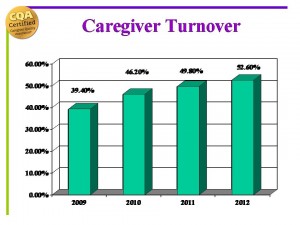By Stephen Tweed, CSP
What can you do to keep your caregivers? The 2013 Private Duty Benchmarking Report shows that caregiver turnover is again this year for the 4th consecutive year, hitting 52.6%. That means that 53 of every 100 caregivers quit or was terminated last year.
Using the Bad Hire Calculator from Caregiver Quality Assurance, we calculated that the average cost of a bad hire was $1,576.24. That means that if you had 100 caregivers last year, and 53 of them quit or were terminated, it would cost you $78,812.
I don’t know about you, but there are lots of things I can do with $78,000 to grow my business.
Top Strategies for Caregiver Retention
Because caregiver turnover is such a huge issue in home care, and getting worse, we’ve continued to do research on this topic to help you understand what you can do to reverse the trend. Our research shows that the three most significant factors in caregiver retention are:
1. Appreciation and Recognition – your caregivers will stay with you and your company if they feel valued and appreciated. That means we need to find innovative ways to show appreciation for caregivers so they feel valued. And, we need to find innovative ways to provide formal recognition, including tangible rewards.
2. Meaningful Work – your BEST caregivers are folks who really believe in what they do. They love their clients and really believe they are making a difference in their lives. As a business owner, you can keep your best caregivers by making sure they have the opportunity to do meaningful work for their clients with a minimum of hassle.
3. Servant Leadership – there is plenty of evidence to support the principle that caregivers will continue to work for a leader who puts service before self. The concept of “Servant Leadership” was first describe by Robert Greenleaf, a retired AT&T executive who studied leadership and employee engagement. He wrote a now-famous essay about the concept, and then followed with several books.
If you are serious about growing your home care business, and you would like to create a culture of exceptional customer experiences, then you may want to explore the principles of Servant Leadership. A servant leader is significant because they:
1. Create a sense of hope through mission and vision
2. Are guided by core values that are clear
3. Accept and show reverence for their followers
4. Trust others and release control
5. Demonstrate frequent, persuasive communication
6. Listen to those they influence
7. Make a commitment to personal transformation
Over the years, I’ve met a number of gifted home care leaders who really demonstrate these principles. The result is a growing and profitable business that makes a difference in the lives of clients, families, caregivers, and office staff.
 To help you develop a more clear understanding of the principles of Servant Leadership, we’ll be hosting a special live web conference this week featuring a nationally known author, award winning professional speaker and executive coach Elizabeth Jeffries, RN, CSP, CPAE, the CEO of Executive Mastery … a Tweed Jeffries company, will be with us to discuss the principles of Servant Leadership and how you can apply these concepts to increase the quality of your caregivers, reduce turnover, save money, and serve more clients.
To help you develop a more clear understanding of the principles of Servant Leadership, we’ll be hosting a special live web conference this week featuring a nationally known author, award winning professional speaker and executive coach Elizabeth Jeffries, RN, CSP, CPAE, the CEO of Executive Mastery … a Tweed Jeffries company, will be with us to discuss the principles of Servant Leadership and how you can apply these concepts to increase the quality of your caregivers, reduce turnover, save money, and serve more clients.
Join us on Thursday, July 11, 2013 at 4:00 pm eastern for Servant Leadership in Home Care with Elizabeth Jeffries.




